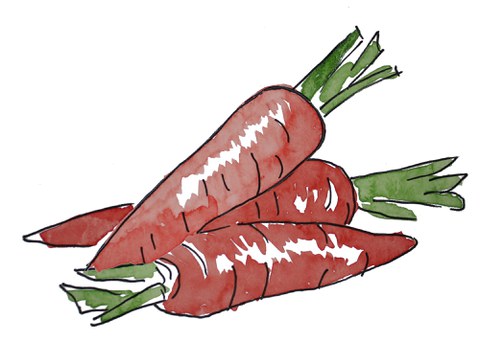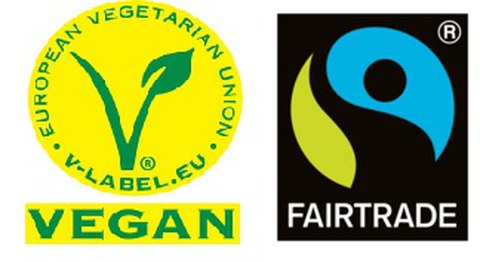Nutrition and food
Table of contents
Tips for a sustainable diet
Genetic engineering
For plant products containing genetic engineering there exists a labeling requirement. The situation is quite different, however, for animal products where genetically modified feedingstuff is used. Here, there is no labeling obligation and the use remains undetected at the point of purchase. Genetic engineering is found primarily in soya feedingstuff, which is predominantly cultivated in genetically modified form worldwide. If you want to avoid genetic engineering, you should buy organically produced meat and dairy product. Here the use of genetically modified substances is prohibited. You can also buy products with a voluntary label ("without genetic engineering") from the producer.
Meat consumption
The 2019 Intergovernmental Panel on Climate Change (IPCC) Special Report on Climate Change and Land Systems, in which renowned scientists compiled their findings, makes it clear that livestock farming leads to high greenhouse gas emissions, as well as high land and water consumption. The negative consequences for the environment of keeping and feeding animals are significantly greater than those of a plant-based diet. In addition, there are animal ethics concerns associated with factory farming, as well as health risks.
Those who eat a predominantly plant-based diet save resources, reduce emissions and animal suffering, and live healthier.
Click here to evaluate your own meat consumption: https://www.blitzrechner.de/fleisch/
Regionality and seasonality
Regional agriculture and value creation offer many ecological, social and economic local benefits. It means employment in the region, nutrient cycles can be closed more easily and long transport routes are eliminated. In addition, solutions adapted to local conditions can be used for land use, species and soil protection, and climate adaptation.
Tip: With the help of a seasonal calendar, it is easy to see what is currently available freshly harvested. If you follow this, you can avoid energy-intensive cold chains and heated greenhouses.
Tips for sustainable food procurement
Many opportunities exist for more sustainable consumption, low-cost supply and to avoid food waste. Here are just a few examples:
Foodsharing
The Initiative against Food Waste rescues food from shops and private households from disposal and distributes it to the community free of charge. Furthe information: https://foodsharing.de/
Solidarische Landwirtschaft (SoLaWi) - Solidarity Farming
In solidarity farming, a certain number of households share the harvest or the products of a farm. All so-called "harvest sharers" usually commit themselves to paying fixed amounts for a period of one year and receive their share of the harvest in return. Both sides benefit from a secure income and regional, most times organically produced products. In Dresden you can find the following SoLaWis: https://www.dein-hof.de/ und https://www.schellehof.de/
"Unverpackt-Läden" - Shops which sell products without packaging
"Unverpackt" stores sell food and household goods in large containers. When shopping, simply bring your own cans, jars and bags and fill in the products or get deposit containers on site. This avoids unnecessary packaging waste. There are these packaging-free stores in Dresden:
Lose Dresden in Neustadt www.lose-dresden.de
Quäntchen in Pieschen www.quaentchen-dresden.de
2Gut – Dein Unverpackt-Laden in Löbtau www.2gut.info
Binnes unverpackt in Striesen www.binnes-unverpackt.de
Weltläden and Contigo Fairtrade Shops
In addition to good coffee, chocolate and handicrafts, you can get other fair trade products in worldshops. The stores are role models in the observance of fair trade relations and contribute in the long term to the improvement of working conditions in the producing countries. In Dresden you can find the following fair trade stores:
aha LadenCafé und Weltladen (aha cafe and one-world shop)
next to Kreuzkirche and on Hauptstraße www.ladencafe.de
Quilombo "Eine-Welt"-Laden und Verein (Quilombo one-world shop and association)
in Löbtau (Schillingstr. 7) www.quilombo-dresden.de
CONTIGO Fairtrade Shop Dresden
Prager-Str. https://contigo.de/contigo-fairtrade-shops/dresden/
Eine-Welt-Laden Radebeul (One-world shop Radebeul)
in Radebeul http://www.faire.de/cms/front_content.php?idart=69
Verbrauchergemeinschaft (VG)
The Verbrauchergemeinschaft (Consumer Community) sells environmentally friendly products from the region in its own stores in Dresden. The community is organized through a cooperative and an association. As a member, you pay a monthly fee, which finances the stores. You can then buy food in the VG stores at the cooperative's low price. Further information: https://www.vg-dresden.de/
App "To Good To Go"
With this app you can buy surplus food portions in restaurants or stores at a low price. In the app, you choose a restaurant or store in your neighbouthood and can reserve the pickup. This reduces food waste. Further information: https://toogoodtogo.de/
Volxküche/KüFa (Küche für Alle - Kitchen for all)
A Volxküche or KüfA is an organized group cooking at cost price. It is often carried out by self-managed institutions, youth centers or associations with a progressive emancipatory concept. In Dresden you can find, for example, the KüfA collective "Black Wok". (https://blackwok.noblogs.org/).
Labels for organic food - What you should pay attention to
In the EU organic food is usually clearly marked with the organic logo, a leaf with EU stars on a green background. But also other labels exist which even require stricter requirements regarding the production process of food:
- Demeter has the strictest rules for organic products in Germany. The farms follow a holistic concept for biodynamic agriculture. The production conditions go well beyond the legal requirements and work with closed material cycles.
- Naturland also goes beyond the legal requirements of the EU organic regulation. The association sees itself as a pioneer in areas that were not regulated by law in the past, such as organic aquaculture, fisheries and forest utilization.
- Bioland also offers a little more than required by law. Among other things, Germany's largest organic association promotes measures to preserve soil fertility and ecological diversity.
What other labels are important?
The V-label for vegetarian or vegan products is an independently awarded label in Europe. It applies to food and other products, including cleaning products and cosmetics.
The Fairtrade label is used for fairly traded products where producers receive stable prices for their goods in long-term trading relationships. The focus is on social working conditions, occupational safety and environmental protection as well as on the promotion of democratic structures.



